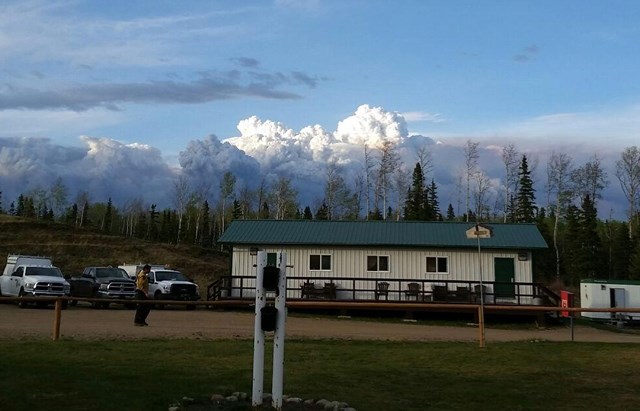A former Sundre resident who recently became a professional forest firefighter in Fort McMurray has found herself in the middle of the unravelling devastation happening there.
“As a parent, it could really give you sleepless nights,” said Sundre resident Mike Beukeboom, father of Kira Beukeboom, 23, who was born and raised in town and graduated from high school here.
However, upon learning more about the methods firefighters use to combat such a blaze, Beukeboom said he became “quite comfortable with her being up there.”
Fire crews don't get in front of a fire — they work their way up behind it or along its flanks while pumping water along the way. It's a very well thought out system, he said, adding “obviously safety is paramount for the crews on the ground.”
But this particular inferno is simply too large for anyone to approach it on the ground, he said, adding firefighters like his daughter are either on standby or are mainly going after smaller fires that could potentially break out.
The bulk of the effort to fight the wildfire, which spread to a size larger than Calgary, has involved the use of heavy equipment like water bombers and bulldozers on the ground trying to create breaks in the fire. Once the wildfire starts to burn itself out, that's when ground crews get more of an opportunity to put additional pressure on the blaze to snuff it out, he said.
Kira was originally deployed at Fort McMurray's airport, but was relocated to a base camp located about 40 kilometres south of Fort McMurray, and she and her crew ended up being evacuated from there on Wednesday, May 4 because of the threat posed by the spreading wildfire. She spent that night sleeping in a truck, said Beukeboom, who has kept in frequent contact with her.
The ordeal has been the closest thing she will experience to the zombie apocalypse, Beukeboom said she jokingly told him in a text.
While the cause of the fire had not yet been pinpointed as of last week, the inferno is believed to have started out as a grass fire that quickly spread beyond firefighters' ability to control. Fortunately, fire crews were deployed a month early this year in anticipation of an active wildfire season because of the warm, dry conditions and they were able to respond right away, he said.
“Last year was bad. They knew this year would be worse.”
There's simply nothing anyone could have done to stop the wildfire — crews responded very quickly but conditions were ideal for the fire to quickly spread beyond their means to control it, he said.
The blaze is reported to have started on Sunday, May 1. By Wednesday, May 4, a state of emergency was declared and Fort McMurray was completely evacuated — the largest such operation of its kind in Alberta's history. Reports from last week indicated at least 1,600 buildings had been destroyed and that the inferno had grown to such enormous proportions it had begun creating its own weather, including strong winds and lightning.
Beukeboom said he extended his thoughts and prayers to everyone who has been affected by the devastating wildfire that forced the evacuation of almost 90,000 people.
There were as of Friday no fatalities reported as a result of the fire.
If the province did not have adequate emergency systems and plans in place, fire crews and municipal officials would not have been as well prepared, and “God forbid what might have happened,” he said.
“The fact that people are safe and out of harm's way is because of how well those crews and officials have been trained — it's incredible the work they've done.”




